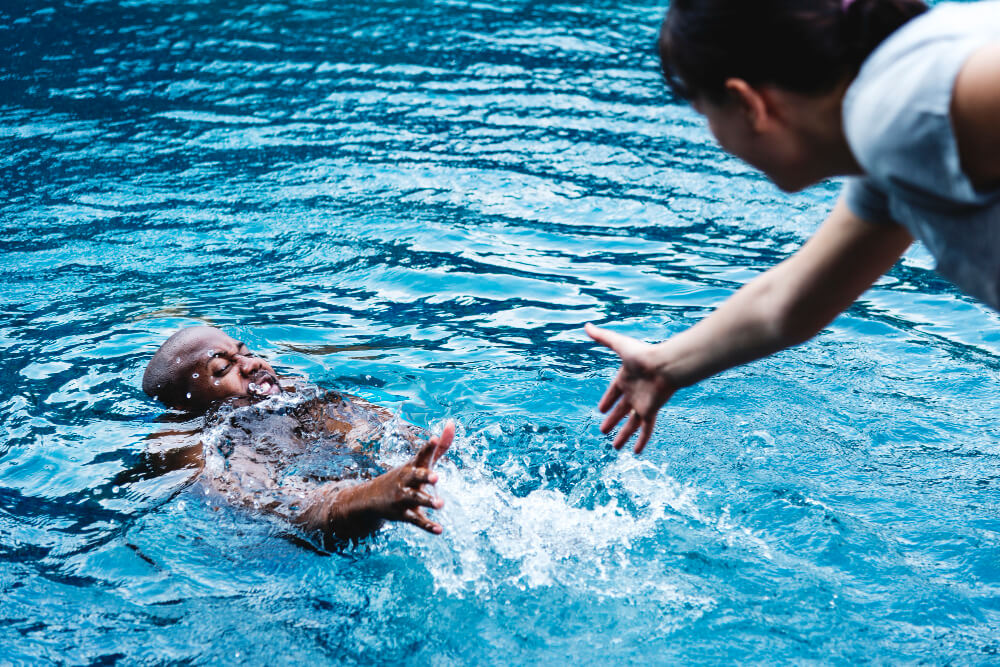Swimming is a great way to get regular physical activity and decrease the risk of chronic illnesses. Swimming is the fourth most popular sports activity in the United States. It can also improve health for people with diabetes and heart disease.
Swimming pools in Louisiana can often become the scene of catastrophic injury-causing accidents when proper safety measures are ignored. Louisiana swimming pool owners and operators are legally obligated to ensure their pools and surrounding areas are free from harm and in a reasonably safe condition for visitors and patrons.
Owners and operators of public pools have the added responsibility of complying with state and Federal regulations to keep their collections safe and equipped with the latest safety devices.
Drowning is the leading cause of death among children. Seventy-four percent of drowning accidents in the country occur at a residential location.
Eleven drowning deaths are in the country per day, out of which six drown in swimming pools.
If you or a loved one has been injured in a swimming pool accident in Louisiana due to the negligent act of someone else, an experienced Louisiana swimming pool accident lawyer can guide and assist you to recover compensation for the injuries and damages suffered.
The Main Causes Of Swimming Pool Accidents
Swimming pool accidents result in devastating injuries and even death. Commonly cited causes of swimming pool accidents and injuries include:
· Slippery conditions;
· When children are left unsupervised in the vicinity of a pool;
· Unsafe pool drains and filters;
· Debris and hazards around the pool;
· Swimming without a lifeguard present;
· Lack of fencing around the swimming pool;
· Lack of swimming skills and knowledge;
· Lack of warning signs;
· Defective safety equipment;
· Swimming while intoxicated;
· Distracted parents;
· Loose steps, ladders, and handrails in the swimming pool;
· Lack of anti-entrapment devices that prevent a swimmer’s clothing, hair, or limbs from getting tangled or caught in a drain;
· Overcrowding in pools and
· Failure to wear life jackets.
Swimming Pool Laws In Louisiana
Federal law requires each state to issue specific pool standards to ensure children’s safety.
No state law in Louisiana requires a homeowner to secure a swimming pool or other such space at their private residence.
However, the state authorizes parishes and municipalities to enact ordinances regulating residential and commercial swimming pool enclosures. The law shall provide minimum heights for fences or walls enclosing the pool and locking or limited access gates.
The Louisiana Administrative Code, Title 51, details the minimum requirement for swimming pool barriers.
Louisiana requires that Class A swimming pools (used for competitions or diving) and Class B swimming pools (exceeding 2.9 feet) must be enclosed with a barrier such as a fence, wall, or other enclosure.
The law also specifies particular requirements for these barriers as well. According to the Louisiana Administrative Code, it must be at least 4 feet tall and cannot be climbable, with no potential footholds on the exterior that a child could utilize. Louisiana law also requires the barrier to be self-closing and self-latching, and it states that the latch must be placed higher than 3 feet so small children cannot reach it.
Louisiana requires pool owners to post pool rules and instructions in a conspicuous place. Most commercial swimming pool rules signs will comply with the Louisiana rules as long as they incorporate all standard safety and health regulations required for swimming pools.
Proving Liability In A Louisiana Swimming Pool Accident
Major factors that help to determine liability include whether the injured party was a trespasser or a guest, whether the pool was a public or a private pool, and what caused the injury.
The liable party for your swimming pool accident in Louisiana will be determined based on the circumstances of the incident. To determine liability, you must decide whether or not you have a premises or product liability claim. In either instance, the at-fault party should have acted negligently.
In premises liability claims, your accident and injuries should have resulted from the negligent actions of a property owner, Operator, or manager. These claims can be made against residential property owners, commercial property owners, and even government entities. Suppose the property owner knew about or should have had reasonable knowledge of the inadequate safety measures. In that case, they legally owe those on their property a duty of care and must take adequate action to protect them.
In product liability claims, your damages will be caused by the pool manufacturer, defective equipment, or faulty pool toy responsible for your accident. A defect could have been made during the manufacturing or design stage, or the equipment may have received inadequate safety warnings or user instructions.
In both premises and product liability cases, you may have the opportunity to bring personal injury claims against businesses or property owners with significant liability policies. This is very different from an auto accident injury case where your compensation might be significantly lesser because of the low policy limits of a driver.
Liable Parties In A Swimming Pool Accident
Parties that can be held liable for a swimming pool accident include:
· Owner of the pool;
· Pool manager or Operator;
· Lifeguard;
· Pool maintenance company;
· Pool equipment company;
· Pool construction company;
· Government agency; and
· Any individual for being reckless or preventing a lifeguard from fulfilling their duty.
Swimming Pools Are Prime Examples Of An Attractive Nuisance
Children are too young to understand the risks and consequences of unsupervised swimming. Louisiana law holds property owners accountable for maintaining an “attractive nuisance “.
An attractive nuisance is any object or property that makes children curious and attracts them towards that object or property.
The Doctrine Of Pure Comparative Negligence
Louisiana has adopted the doctrine of “Pure Comparative Negligence”. Under this doctrine, any damages awarded to a plaintiff will be reduced according to the percentage of their fault in the accident.
Any swimming pool owner is bound to argue that the victim should bear some blame for the swimming pool accident.
Proof of the plaintiff’s partial negligence will not bar a claim entirely, but it could reduce the overall compensation awarded. It is the responsibility of the defendant to establish Comparative Negligence. The swimming pool owner must prove that the plaintiff did not demonstrate reasonable care and were responsible for injuries sustained.
Bart Bernard Injury Lawyers: Our Lawyers Know How To Leverage Medical Knowledge In Personal Injury Cases
Many injuries suffered in accidents in and around swimming pools can result in catastrophic injuries that are no less grievous than fatal drownings. Many non-fatal drownings may result in anoxic brain injuries in which the brain is deprived of oxygen long enough to result in brain damage that can be both severe and permanent. Symptoms of anoxic brain injuries can include memory loss, vision loss, cognitive issues, loss of movement, and other symptoms up to and including persistent coma.
Personal injury lawyers have to know more than just what the law is. At Bart Bernard Injury Lawyers, our lawyers try to thoroughly understand the medical aspects of a client’s injury to achieve the total amount of compensation necessary for future medical expenses, rehabilitation therapy, and other costs that may be incurred over a lifetime dealing with a permanent brain injury from a swimming pool accident. Award-winning Louisiana trial lawyer Bart Bernard can provide an extensiveness of insight and experience rarely found elsewhere. He has a strong understanding of Louisiana trial procedure and the ability to present evidence and arguments clearly and eloquently before a judge or jury.
Suppose you or a loved one have suffered injuries in a swimming pool accident in Louisiana due to the negligence of a property owner, lifeguard, pool maintenance company, equipment manufacturer, or another person. In that case, you deserve to be duly compensated for your injuries.
Call an attorney at our Louisiana personal injury law firm for a free case evaluation immediately.





